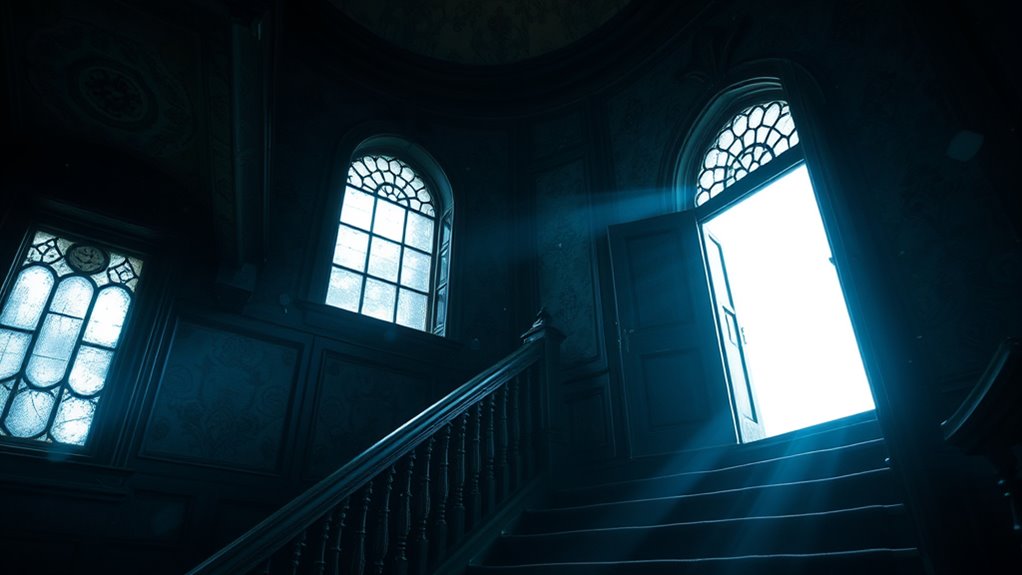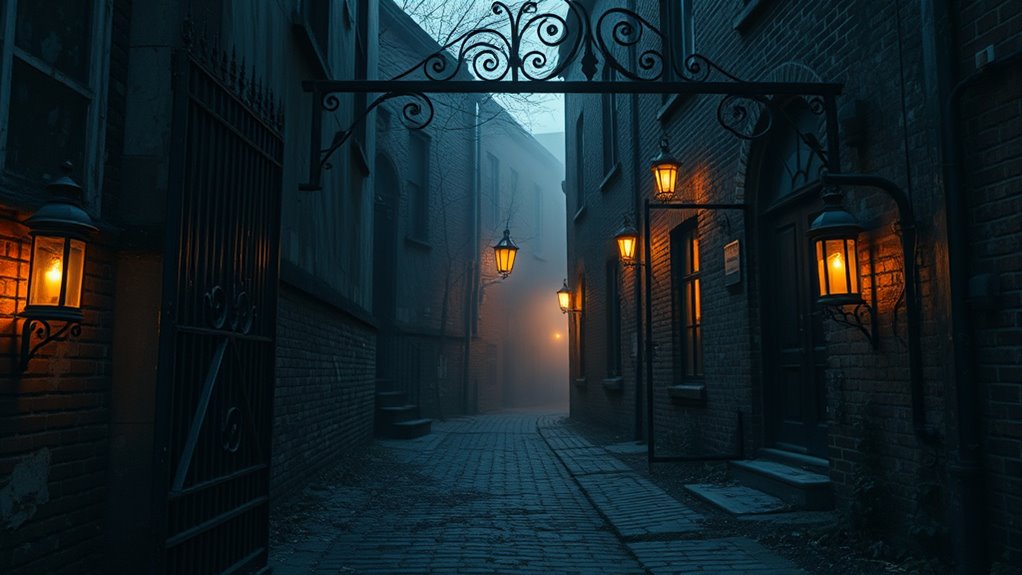Before exploring haunted locations, you need to get permission from the property owner or manager. This shows respect for their property, helps avoid legal trouble, and often provides valuable insights into the site’s history. Research who owns or manages the site, then politely reach out to request access. Proper authorization fosters good relationships and enhances your experience. If you want to learn more about how to secure permission effectively, continue exploring these essential steps.
Key Takeaways
- Research and identify the property owner or manager to request permission legally.
- Approach property owners politely, explaining your interest in exploring the haunted site.
- Understand local laws and regulations to ensure compliance before seeking access.
- Obtain written or verbal permission to avoid trespassing and legal issues.
- Building a respectful relationship with owners can provide access and valuable site insights.

Have you ever hesitated before asking for what you really want? Maybe there’s a haunted location you’ve always been curious about, but uncertainty holds you back. When it comes to exploring places rumored to be haunted, permission is often the most vital step. Without it, you risk facing more than just ghostly encounters—you could also encounter legal considerations that make your adventure far more complicated. Understanding how to gain proper access ensures your exploration is both respectful and lawful, preventing unnecessary trouble along the way.
First, it’s essential to recognize that many haunted locations are private property or protected sites. Even if a place has a reputation for ghostly encounters, it doesn’t mean you can just stroll in. You must seek permission from the property owner or manager. This step isn’t just about good manners; it’s about respecting boundaries and avoiding trespassing charges. If you’re determined to explore, start by doing your research: find out who owns or manages the property and reach out politely. Explain your interest and ask if you could be granted access. Sometimes, owners appreciate the enthusiasm and may even join you or offer guidance, making your experience more meaningful.
Many haunted sites are private; always seek permission before exploring to respect boundaries and avoid legal issues.
Legal considerations also come into play. Trespassing isn’t just a matter of ethics—it’s a criminal offense in many jurisdictions. If you enter a haunted location without permission, you could face fines, arrest, or other legal consequences. Additionally, some properties are protected by local laws or regulations that prohibit unauthorized access, especially if the site is considered historically or culturally significant. Ignoring these rules could tarnish your reputation and cause legal headaches that overshadow your ghostly encounters. To avoid this, always verify whether the location requires special permits or permissions and adhere strictly to those requirements. Legal permissions are crucial for a worry-free exploration.
Securing permission isn’t just about legality—it’s about fostering good relationships and ensuring your safety. Property owners and managers can provide valuable insights into the history of the site, its supposed paranormal activity, and the best ways to explore it without causing damage. They might even accompany you on your investigation or suggest times when the location is less crowded or more accessible. Respecting the rules and obtaining proper authorization not only keeps you out of trouble but often enhances your overall experience, making your ghostly encounters more authentic and respectful. Additionally, understanding the property rights involved can help you navigate any restrictions or requirements smoothly.
In the end, the work to access haunted locations begins with asking for permission. It’s the responsible, legal, and respectful way to pursue your curiosity about ghostly encounters. Taking these steps shows that you value the site’s history and integrity, and it ensures your adventures remain safe, lawful, and truly rewarding. Engaging with property owners or managers can provide you with additional insights and help ensure your exploration is conducted responsibly. Remember, showing respect for property rights is essential in any exploration, especially in sensitive or protected locations.
Frequently Asked Questions
What Are the Legal Consequences of Trespassing on Haunted Sites?
You should know that trespassing on haunted sites can lead to serious legal repercussions. Authorities may charge you with criminal trespass, which can result in fines, community service, or even jail time depending on the trespassing penalties in your area. The legal consequences serve as a reminder to always seek permission before accessing private or restricted haunted locations, ensuring you avoid costly legal issues and respect property boundaries.
How Do Investigators Verify Paranormal Activity Legitimately?
To verify paranormal activity legitimately, you should document ghostly apparitions with clear visual or video evidence, and record EVP recordings to capture unexplained voices. Conduct thorough investigations using reliable equipment, such as EMF meters and thermal cameras, while maintaining a logical approach. Cross-reference findings with other investigators and avoid jumping to conclusions, ensuring your evidence is credible and convincing for genuine paranormal activity.
Are There Specific Permits Required for Film or Photo Shoots?
Imagine capturing haunting scenes—do you need location permits or filming permissions? Yes, securing these permits is essential to avoid legal trouble and ensure smooth filming. You’ll usually need to contact property owners or local authorities for location permits, especially for historic or restricted sites. Ignoring these requirements risks fines or having your shoot shut down. Always plan ahead, obtain the necessary permissions, and respect the location’s rules to keep your project on track.
What Safety Precautions Are Recommended When Exploring Haunted Locations?
When exploring haunted locations, you should prioritize safety by wearing personal protective equipment like sturdy footwear, gloves, and flashlights. Always stay aware of your surroundings and have emergency preparedness plans in place, such as knowing exit routes and carrying a first aid kit. Avoid risky structural areas, and never explore alone. These precautions help guarantee your safety and let you enjoy the experience responsibly and securely.
How Do Property Owners Typically Respond to Paranormal Investigations?
Imagine knocking on a creaky door, your heart pounding as you ask a property owner about paranormal investigations. They often respond cautiously, weighing property owner negotiations and ethical considerations. Some welcome your work, intrigued by the stories lurking in shadows, while others hesitate, fearing disturbance or damage. Respectful communication and transparency usually ease their concerns, fostering trust. Ultimately, their response hinges on how well you navigate these negotiations and honor their property and privacy.
Conclusion
Getting permission to access haunted locations isn’t just about legality—it’s about respecting history and ensuring safety. Imagine exploring an abandoned asylum, only to find the doors unfastened because you secured proper consent. That sense of accomplishment, knowing you honored the site’s past, makes the experience unforgettable. So, always seek permission first; it transforms a risky adventure into a meaningful journey, allowing you to connect with history while staying safe and respectful.









